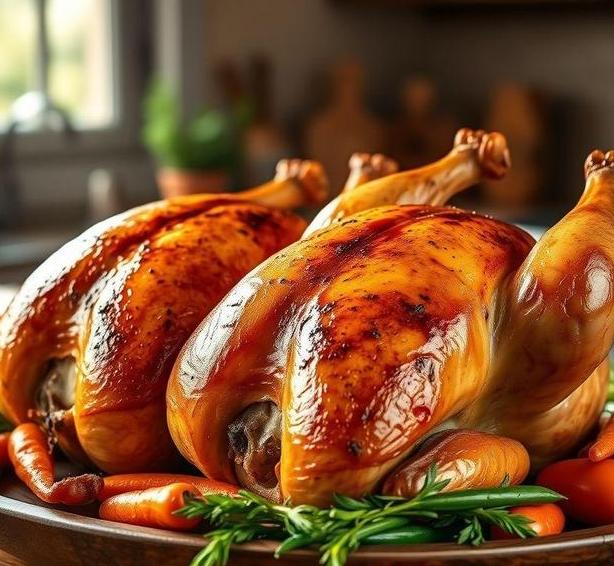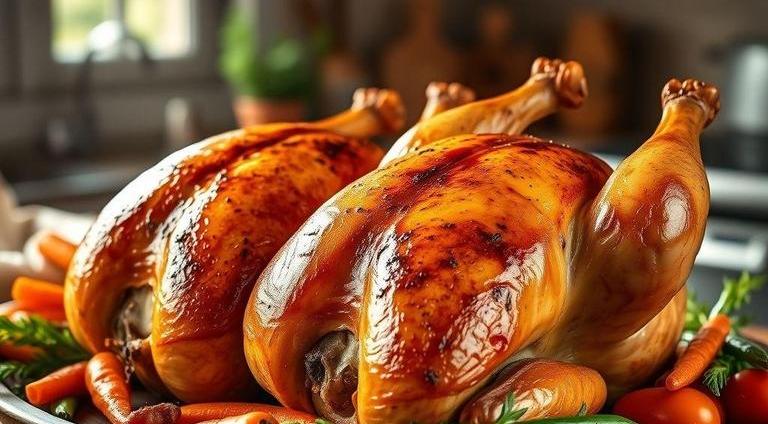Cornish hens, often regarded as a delicacy for their tender and flavorful meat, are small chickens that typically weigh around 2 pounds. They are popular in gourmet cooking, especially for their individual serving sizes and juicy texture when roasted. However, just like any other poultry, Cornish hens can go bad if not handled properly. Spoiled meat is not only unpleasant in taste and texture but can also pose serious health risks. This guide will help you understand everything you need to know about the shelf life, spoilage signs, and proper storage methods for Cornish hens, ensuring that you can enjoy them safely and deliciously every time.
Can Cornish Hens Go Bad?
Yes, Cornish hens can definitely go bad if not stored or handled correctly. Since they are poultry, they are highly susceptible to bacterial growth, particularly Salmonella and Campylobacter, which can lead to foodborne illnesses if consumed in an unsafe state. The primary reason for spoilage is bacterial growth, which occurs rapidly in warm or improperly stored environments. The spoilage process can be influenced by a variety of factors, including:
- Storage temperature: Keeping your hens at an incorrect temperature is one of the quickest ways to cause spoilage.
- Packaging: If the packaging is compromised, air and moisture can get in, accelerating spoilage.
- Time: Just like all other meat, Cornish hens have a limited shelf life, and the longer they sit in your fridge or freezer, the higher the chances of bacterial contamination or freezer burn.
Shelf Life For Cornish Hens

The shelf life of Cornish hens depends heavily on how they are stored. Here’s a breakdown of what you can expect:
-
Fresh Cornish Hens (unopened)
- In the fridge: 1 to 2 days. Fresh, uncooked Cornish hens should be used quickly to ensure safety and freshness. After this time, bacteria will start to multiply.
- In the freezer: 1 year. If you’re not planning to cook them right away, freezing fresh Cornish hens is a great way to extend their shelf life significantly.
-
Cooked Cornish Hens
- In the fridge: 3 to 4 days. Cooked Cornish hens will last a bit longer than raw ones but should still be eaten within a few days for safety.
- In the freezer: 4 months. If you have leftover cooked hens, freezing them can preserve their flavor and texture for several months.
-
Vacuum-Sealed Or Frozen Cornish Hens (purchased From The Store)
- In the fridge: Follow the use-by date indicated on the packaging. However, once opened, they should be cooked within 1 to 2 days.
- In the freezer: They will typically last for up to 1 year, though after a few months, the quality may start to degrade.
Common Signs Of Spoilage
Knowing how to identify spoilage is crucial for your health and safety. Here are the most common signs that your Cornish hen has gone bad:
- Unpleasant odor: Fresh poultry has a clean, mild smell. If your Cornish hen has a sour, rotten, or pungent odor, it is likely spoiled.
- Discoloration: Fresh Cornish hens should have a pale pink color. If you notice any greenish, grayish, or yellowish spots, these are signs that bacteria have started to break down the meat.
- Slimy texture: Fresh meat is firm and moist to the touch. If your Cornish hen feels slimy, sticky, or tacky, it has started to spoil.
- Changes in the texture of the flesh: Spoiled Cornish hens often develop an undesirable soft, mushy texture when touched or cut.
- Freezer burn (if frozen): If the meat has been stored for a long time in the freezer and shows discoloration, dehydration, or ice crystals on the surface, it might not be harmful to eat, but the flavor and texture will be compromised.
- Expired sell-by date: If the Cornish hen has passed its sell-by or use-by date, it’s a good idea to check for signs of spoilage, even if it appears to be fine.
How To Store Cornish Hens?

Proper storage is essential to keep Cornish hens fresh and safe to eat. Here’s a detailed look at how to store them:
-
Refrigeration
- Before cooking: Keep your Cornish hens in their original packaging or wrap them tightly in plastic wrap or aluminum foil. Store them on the bottom shelf of your fridge to prevent any juices from dripping onto other foods. Always ensure your fridge is set to 40°F (4°C) or lower.
- After cooking: Once cooked, allow the hen to cool to room temperature (within 2 hours), then refrigerate it in an airtight container or wrap it in plastic wrap or foil. This helps keep it fresh for up to 3 to 4 days.
-
Freezing
- Before cooking: If you’re not planning to cook your Cornish hen within a day or two, freezing is the best option. Wrap it tightly in freezer-safe plastic wrap, followed by aluminum foil, or store it in a vacuum-sealed bag to prevent freezer burn. Label the package with the date to keep track of its storage time.
- After cooking: If you have leftovers, let the hen cool completely before wrapping it tightly in plastic wrap or placing it in a freezer-safe container. Be sure to label it as well.
- Thawing: When you’re ready to cook or eat a frozen Cornish hen, thaw it in the refrigerator for 24 hours. Never thaw poultry on the counter, as this can encourage bacterial growth. You can also thaw it using a microwave or cold water method if you’re in a hurry, but be sure to cook it immediately afterward.
Expert Tips
- Don’t wash your Cornish hen before storing it! While it might seem like a good idea to rinse your bird off, washing it actually increases the risk of spreading bacteria. Instead, simply pat it dry with paper towels if needed.
- Use a meat thermometer: To ensure that your Cornish hen is cooked to a safe internal temperature (165°F or 74°C), use a meat thermometer. This is essential in avoiding undercooking, which can lead to foodborne illnesses.
- Don’t leave cooked hens out: Bacteria multiply quickly at room temperature. Never leave cooked Cornish hens out for more than two hours, or one hour if the temperature is above 90°F (32°C).
- Check your freezer regularly: If you plan on storing Cornish hens for an extended period, periodically check the temperature of your freezer to ensure it’s at or below 0°F (-18°C).
FAQs
Can Cornish Hens Go Bad If Left At Room Temperature?
Yes, Cornish hens, like all poultry, can go bad if left at room temperature for more than two hours. Bacteria can grow rapidly in temperatures above 40°F, increasing the risk of foodborne illness.
How Can You Tell If A Cornish Hen Has Gone Bad?
Signs that a Cornish hen has gone bad include a sour or off-putting smell, a slimy texture, and a change in color (such as grayish or greenish hues). If the hen feels mushy or tacky to the touch, it’s likely spoiled.
Can Cornish Hens Go Bad In The Freezer?
Cornish hens can be stored in the freezer for up to one year if properly wrapped and sealed. While the hens may remain safe to eat after that period, their quality, flavor, and texture may degrade over time.
What Is The Shelf Life Of A Cornish Hen In The Refrigerator?
Raw Cornish hens can last in the refrigerator for 1-2 days. Cooked Cornish hens should be consumed within 3-4 days when stored in the fridge.
Can Cornish Hens Go Bad After Cooking?
Yes, cooked Cornish hens can go bad if not stored properly. They should be refrigerated within two hours of cooking and consumed within 3-4 days. If left out longer than that, they can develop harmful bacteria.
How Should I Store Cornish Hens To Prevent Them From Going Bad?
Cornish hens should be stored in airtight containers or tightly wrapped in plastic wrap or aluminum foil. Raw hens should be kept in the coldest part of the refrigerator, while cooked hens should be refrigerated promptly in sealed containers.
Can You Eat A Cornish Hen That Smells Bad?
No, you should not eat a Cornish hen that smells bad. A foul or sour odor indicates spoilage and the presence of harmful bacteria, which can cause foodborne illness if consumed.
Is It Safe To Eat Cornish Hens After The Expiration Date?
It is not recommended to eat Cornish hens after the expiration date, as the quality and safety of the meat may have deteriorated. Always check for signs of spoilage, such as odor, color change, or texture before consuming.
Can I Freeze Cornish Hens To Extend Their Shelf Life?
Yes, freezing Cornish hens is an effective way to extend their shelf life. Ensure they are properly wrapped in freezer-safe packaging and labeled with the date. They can stay frozen for up to one year without compromising safety.
Can Cooking A Spoiled Cornish Hen Make It Safe To Eat?
No, cooking a spoiled Cornish hen will not make it safe to eat. While heat may kill some bacteria, it cannot eliminate all harmful pathogens that may have developed, which could still lead to foodborne illness.